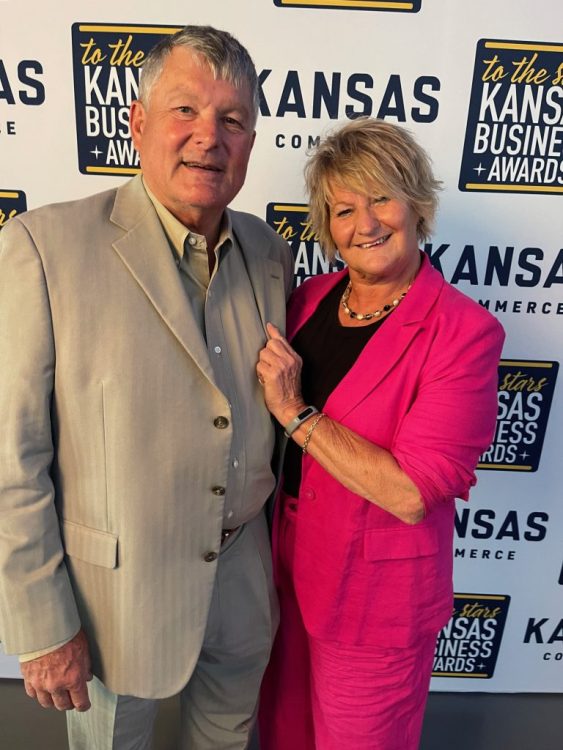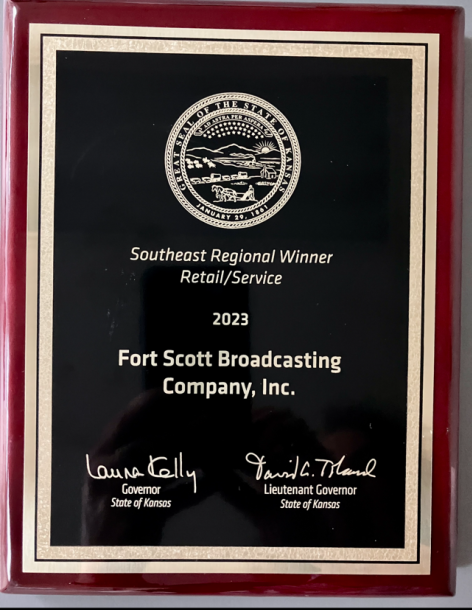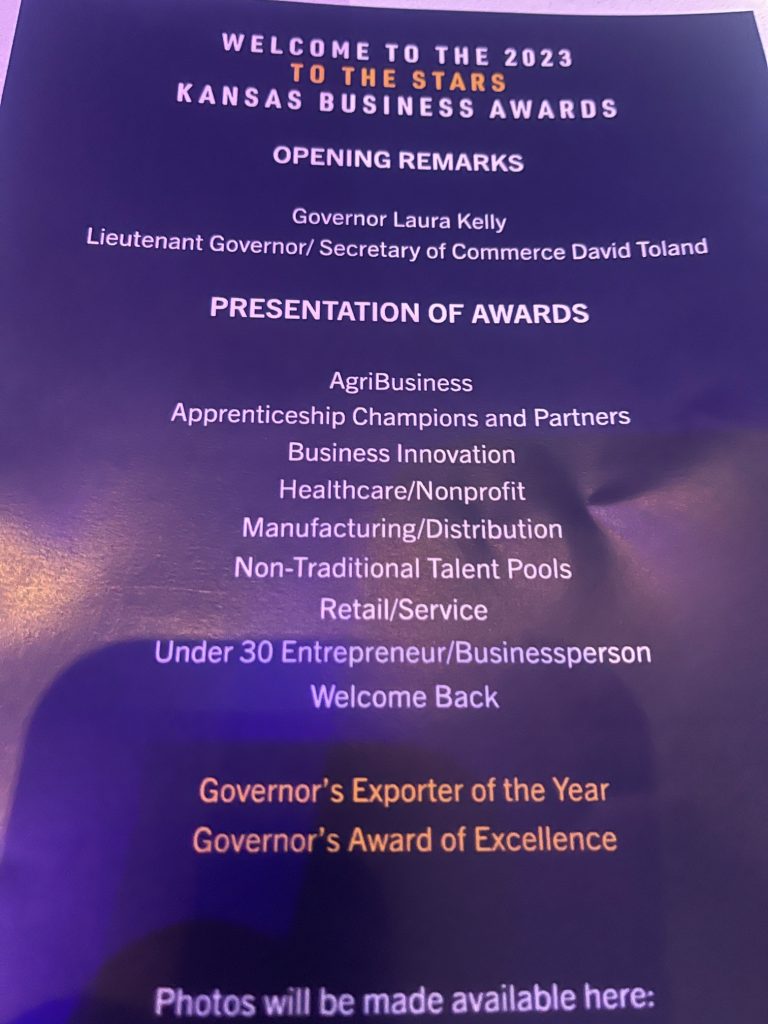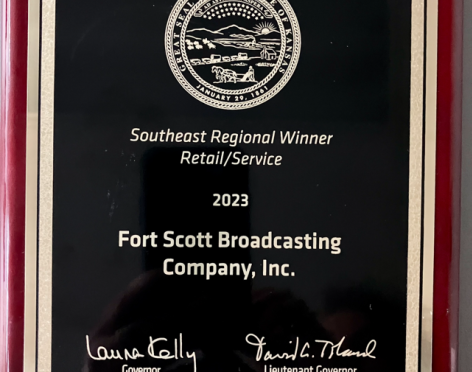|
Category Archives: Kansas
KS Announces 5-Year Blueprint to Ensure Reliable, Quality Water Supply
|
Kansas Main Street Program Seeking New Communities
Governor Kelly Encourages Communities to Join Kansas Main Street Program
TOPEKA – Governor Laura Kelly announced today that the Kansas Main Street program is seeking new communities to join the program in 2024. Kansas Main Street provides technical assistance and support for communities working to revitalize their downtown areas by focusing on economic vitality, design, promotion, and organization.
The Kansas Main Street program was initially launched in 1985 but was ended in 2012 under the Brownback Administration. Governor Kelly restarted the program in 2019 with support from the Kansas Legislature.
“The Kansas Main Street Program has been crucial to preserving and growing downtowns across the state,” Governor Laura Kelly said. “Downtown areas are the heartbeat and pride of most communities across Kansas, and improving these community pillars is part of how we’ll bring new jobs to the area.”
Communities wishing to submit applications must first attend a virtual application workshop, which will explain the Main Street Approach and the process for completing the application. Main Street Kansas will host the next virtual application workshop at 10 a.m. Monday, November 13.
Applications for the Kansas Main Street program will open on December 4 and close on January 26, 2024. Applications will be reviewed in February, with new communities announced in March.
“Eleven communities have been added since Governor Kelly brought the Kansas Main Street program back in late 2019,” Lieutenant Governor and Secretary of Commerce David Toland said. “These Kansas communities now have the resources and tools needed to support economic development and breathe new life into their downtowns and historic commercial districts.”
Benefits of earning designation as a Kansas Main Street community include:
- Comprehensive technical assistance from the state and national programs to further economic development downtown
- Training in strategic planning, program capacity-building, and organizational management for the Main Street organization
- Individualized training for Main Street managers, boards, and other Main Street participants
- Attendance to statewide quarterly training and professional development opportunities
- Access to design services to help downtown property owners undertake effective rehabilitation, restoration, adaptive reuse, and infill projects, as well as reimagining public spaces within the district
- Access to business assistance such as recruitment and retention, succession planning, business plan development, and entrepreneurial development
- Membership in the Main Street America network
“The Main Street Approach is a proven economic development tool, especially for small, rural communities,” Kansas Main Street Director Scott Sewell said. “It has been a great resource for communities in Kansas, and we always encourage more participants in the program.”
Registration for the November 13 application workshop is required, which can be completed here.
For more information on the Kansas Main Street program, click here or contact Director Scott Sewell at (785) 230-6404 or [email protected].
###
Grant to Improve Food Assistance Benefits
Federal grant awarded to improve efficiency and access to Kansas Food Assistance program
TOPEKA – The USDA’s Food and Nutrition Services (FNS) program has announced the awarding of a Process and Technology Improvement grant of $706,550 to the Kansas Department for Children and Families (DCF). The grant will enhance the digital system that accepts SNAP, known as Food Assistance in Kansas, applications.
“Our main goal is to reduce status wait times, improve data accuracy, and enhance the overall client experience,” DCF Secretary Laura Howard shared. “This will result in Kansans receiving Food Assistance benefits in a timely manner and ensuring that Food Assistance continues to effectively serve as the primary defense against hunger.”
The FNS Process and Technology Improvement grants supports efforts by state agencies and their community-based and faith-based partners to develop and implement projects that use technology to improve the quality and efficiency of SNAP application and eligibility determination systems.
DCF will automate manual Food Assistance administrative tasks using BOT automation. Using this technology, the agency will be able to register cases, enter data, and create workflow tasks for caseworkers all without human intervention. Workers will receive notification of an issue with an application and then will follow-up with the Kansan to ask questions or get additional details.
In FY 2022, DCF received 147,224 Food Assistance applications. Currently, the state has 95,047 Food Assistance cases that are made up of 106,699 adults and 84,343 children. DCF is working in partnership with Accenture, the technology business manager of the data management system used by the agency for the benefit programs.
The teams will begin working immediately on the upgrades and have up to three years to complete the project using the funding from the FNS grant.
###
USDA’s Food and Nutrition Service (FNS) works to end hunger and improve food and nutrition security through a suite of more than 16 nutrition assistance programs, such as the school breakfast and lunch programs, WIC and SNAP. Together, these programs serve 1 in 4 Americans over the course of a year, promoting consistent and equitable access to healthy, safe, and affordable food essential to optimal health and well-being. FNS also provides science-based nutrition recommendations through the co-development of the Dietary Guidelines for Americans. FNS’s report, “Leveraging the White House Conference to Promote and Elevate Nutrition Security: The Role of the USDA Food and Nutrition Service,” highlights ways the agency will support the Biden-Harris Administration’s National Strategy, released in conjunction with the historic White House Conference on Hunger, Nutrition, and Health in September 2022. To learn more about FNS, visit www.fns.usda.gov and follow @USDANutrition.
KDOT requesting comments on STIP amendment
|
|
|
Fort Scott Radio Station Recognized by Kansas Dept. of Commerce

A local business was recognized during the recent ceremony by The Kansas Department of Commerce held in Wichita on Oct. 12.
To The Stars: Kansas Businesses Awards is an annual awards program that recognizes businesses across the state for the valuable contributions they make to the Kansas economy and to the well-being of their communities, according to https://www.kansascommerce.gov/kansasbusinessawards/.
Fort Scott Broadcasting Co. Inc was recognized as the Southeast Kansas Regional Winner in Retail and Service. Tim and Deb McKenney are the owners of the business.

“Deb submitted the information,” Tim McKenney said. “It was really just a statement about the station’s 70th birthday under the same family ownership and management coming up next year. She mentioned some of our programs we air regularly such as the city, county, and school talk shows to keep folks in tune with current happenings in the area.”
“The award was for 69 years of community service to our community,” Deb said.

The categories were:
- AgriBusiness – companies that stand out in the agribusiness industry – including agricultural production, products and services, and agri-tourism
- Apprenticeship Champions and Partners – companies and other entities that excel providing registered apprenticeship programs in Kansas
- Business Innovation – companies from any sector incorporating innovative technologies in their business
- Healthcare/Nonprofit – noteworthy services provided by either healthcare facilities or nonprofit organizations
- Manufacturing/Distribution – outstanding achievement for companies large and small involved in manufacturing and distribution
- Non-Traditional Talent Pools – companies that have gone above and beyond to hire those with prior involvement in the justice system, youth, seniors or individuals with disabilities
- Retail/Service – exceptional performance by businesses selling goods, products and/or services
- Under 30 Entrepreneurs – young entrepreneurs achieving business success under the age of 30
- Welcome Back – entrepreneurs and businesspeople who once left Kansas but have returned to make their mark in the Sunflower State.
Businesses and individuals from across the state were honored for their outstanding contributions to Kansas communities and the state’s economy at the ceremony, according to a press release.
Governor Laura Kelly announced at the ceremony that Atwood-based SurePoint Ag Systems has won the 2023 Governor’s Award of Excellence and Tank Connection in Parsons earned the Governor’s Exporter of the Year Award, according to the press release.
A record 297 businesses, organizations and individuals were nominated in nine categories for this year’s To the Stars: Kansas Business Awards, according to the release. Nominees were reviewed and scored for various criteria such as business expansion, employee recruitment and retention practices, training and educational programs, capital investments, and support of local community events. A total of 245 Merit Awards and 43 Regional Awards were presented at the event. Additionally, one nominee in each category was designated a Statewide Winner, making them finalists for the Governor’s Award of Excellence.
To view the list of award winners: https://www.kansascommerce.gov/kansasbusinessawards/#h-merit-award-winners
In the regional award winners division for retail/ service across the state, the winners were:
From the Southeast section of the state, the regional winner was Fort Scott Broadcasting All Hit 103.9 fm, 98.3 fm, and 1600 am.
East Central
JT’s Grill
Northwest
Shores Napa Auto Parts
Northeast
Lumber House True Value
South Central
Country at Heart
Southwest
Jetmore Veterinary Service
KS Flags Are Half-Staff In Honor of Judge Malcolm
Governor Kelly Directs Flags be Flown at Half-Staff in Honor of Magistrate Judge William Malcolm
TOPEKA— Today, in accordance with Executive Order #20-30, Governor Laura Kelly directed flags be lowered to half-staff at the State Capitol Complex and all court buildings and facilities until Monday, October 23, 2023, to honor 21st District Magistrate Judge William Malcolm, who died from injuries sustained in a car accident earlier this month.
“Judge Malcolm was a dedicated public servant who, for nearly two decades, worked hard to ensure justice for the citizens of Clay and Riley counties,” Governor Laura Kelly said. “On behalf of the State of Kansas, I thank him for his service. My deepest condolences go out to his loved ones.”
Judge Malcolm passed away on October 15, 2023. A public visitation will be held on Sunday, October 22, 2023.
To receive email alerts when the governor orders flags to half-staff, please visit: https://governor.kansas.gov/
###
Child Support Services Impacted by Kansas Court’s Network Security Issue
CORRECTED: Child Support Services Impacted by Kansas Court’s Network Security Issue
TOPEKA – Due to the network security issue announced by the Kansas Judicial Branch last week, the Kansas Department for Children and Families (DCF) is informing Kansans of delays that will occur to those working with the agency’s Child Support Services.
DCF works daily with Kansas courts to process child support court orders and payments on behalf of Kansas families. With the efiling and electronic court records system offline, Kansans should expect delays on returned filings, court hearings and orders being entered. Child support payments that are awaiting court orders or direction from DCF, Court Trustees, and county clerks will be delayed. Any orders filed prior to the week of Oct. 9 should continue to process properly.
DCF and its contracted partners of YoungWilliams and Maximus will continue to provide full-service operations through paper and fax filings. Johnson County is not impacted by this as the county operates on an efiling and case management system used only by the county.
Individuals with cases in process should consult the Child Support Services customer hotline at 1-888-757-2445 with questions or status information. Updates will be provided at the Kansas Payment Center website www.KSPayCenter.com.
Wild Game and Foraged Food Cooking Competition on Nov. 19 in Lawrence
|
Walking and Biking To School Program Is Accepting Applications
|
|
|
Two Protected Mussel Species Released Back into Kansas Rivers
KDWP Successfully Stocks Two Protected Species Back into Kansas Waters
Freshwater mussels – essentially clams that have adapted to live in freshwater streams, rivers, and lakes – reach their greatest diversity in North America. Nearly 300 species of mussels occur in the U.S., 40 of which reside in Kansas. Of those in Kansas, nearly 60 percent have some level of conservation concern and most have disappeared from part of their historical range.
PRATT – Fisheries and Ecological Services staff at the Kansas Department of Wildlife and Parks are taking action to bolster some of the state’s most at-risk aquatic species. Via the Department’s Aquatic Species Recovery Program and Kansas Aquatic Biodiversity Center, located at the Farlington Fish Hatchery, staff work together to propagate, grow, and stock vulnerable aquatic species back into their former habitats; and this fall, that included two protected freshwater mussel species.
Fatmucket Mussels in Marmaton River
KDWP first released 7,175 Fatmucket mussels – ranging in age from 1-3 years old – into the Marmaton River to bolster local populations. These were the first mussels ever released from the KABC, which opened its doors in 2018. And while Fatmuckets occur throughout central North America, they are considered a Species in Need of Conservation in Kansas.
“We chose the Marmaton River as the release site due to historical data and current observations that indicate the species is native to this drainage,” said Seth Lundgren, KDWP district fisheries biologist. “It also helped that the parental stock came from a shared tributary of the Marais Des Cygnes River, ensuring the correct genetics were also released into the drainage.”
Lundgren added that, prior to stocking, each of the offspring were marked with a unique “glue dot” that can be used by researchers for future identification.
Neosho Mucket Mussels in Neosho River
The second successful stocking of a protected species occurred later in the same week when approximately 1,374 federally-endangered Neosho Mucket mussels were released into the Neosho River. The offspring were the result of populations housed at the Neosho National Fish Hatchery and Kansas City Zoo and Aquarium. The Neosho Mucket occurs in Kansas, Arkansas, Missouri, and Oklahoma but no longer occurs in 62 percent of its historical range.
“This stocking was the first of its kind conducted under KDWP’s Aquatic Species Recovery Program,” said Trevor Starks, KDWP species recovery coordinator. “Landowner agreements signed under this program seek to reestablish self-sustaining populations of imperiled fish and mussel species in order to recover, delist, and deregulate those populations. These agreements provide regulatory protections to landowners who wish to partner with the agency to allow species releases and monitoring on their property.”
More Conservation Stockings to Come
Staff at KDWP have several additional conservation stockings like these planned for 2024, including 18,000 mussels set to be released in southeastern Kansas as soon as drought conditions improve. The KABC has also been working to rear Plains Minnows, classified as a state-threatened species, for release back into their historic range in areas where they have since disappeared.
Landowners interested in helping recover imperiled species through the Kansas Aquatic Species Recovery Program are encouraged to contact Starks at [email protected].
For more information on threatened, endangered, and SINC species in Kansas, visit ksoutdoors.com/Services/
Help Identify Areas of Need for High Speed Internet
Governor Kelly Invites Public Input on Volume 2
of Broadband Plan
TOPEKA – Governor Laura Kelly today announced the release of the Broadband Equity Access and Deployment (BEAD) Initial Proposal Volume 2. As part of the planning process, the public is invited to submit their comments on the planning document. Together with the BEAD 5-Year Action Plan, Volumes 1 and 2 will help identify areas of need for high-speed internet buildout across the state and outline requirements for applicants to access grant funding.
“Our vision for Kansas is one where every resident, regardless of their location, has access to affordable, reliable internet,” Governor Laura Kelly said. “The Volume 2 planning document sets a clear path to achieving that goal. I encourage all Kansans to be involved in the public comment process.”
Volume 2 outlines defined objectives for broadband infrastructure projects, transparent subgrantee selection processes, and the active participation of eligible entities, all aimed at providing affordable broadband service options to residents.
Additional components of Volume 2 include:
- Plans for equipping the workforce with the necessary skills and resources to support broadband infrastructure development
- Initiatives to promote the inclusion of Minority Business Enterprises (MBEs) and Women Business Enterprises (WBEs) in broadband projects
- Strategies for identifying and mitigating cost-related barriers to broadband deployment
- Consideration of the environmental impact of broadband projects and efforts to minimize their carbon footprint
- An outline of the regulatory approach to be taken by eligible entities in support of broadband infrastructure development
“As we continue to support and invest in broadband infrastructure, we’re not just connecting people; we’re creating opportunities,” said Lieutenant Governor and Secretary of Commerce David Toland. “High-speed broadband promotes access to telehealth, remote work, distance learning and entrepreneurship, which enrich our communities and create pathways to prosperity for Kansans.”
The BEAD program, established by the federal Infrastructure Investment and Jobs Act of 2021, has allocated more than $451 million to Kansas for the development of broadband networks.
The Kansas Office of Broadband Development remains committed to its mission of closing the digital divide and looks forward to continued collaboration with stakeholders to bring high-speed broadband connectivity to all communities across the state.
“This planning document is key to guiding a historic level of investment into broadband infrastructure,” Kansas Office of Broadband Director Jade Piros de Carvalho said. “Our office is committed to an open and fair granting process that ensures the best use of public funds.”
Public comments on Volume 2 can be submitted online here until November 12, 2023.
Learn more about the Broadband Equity Access and Deployment Plan here.

